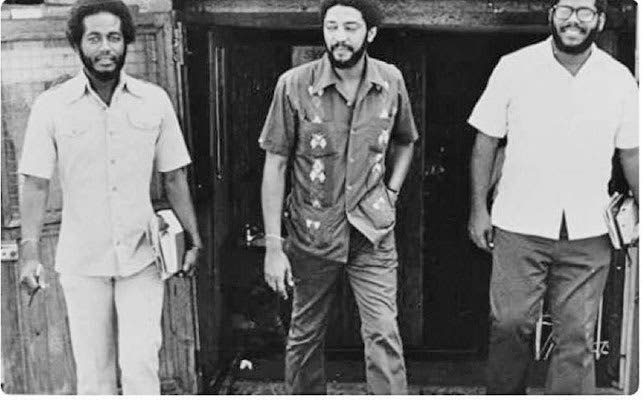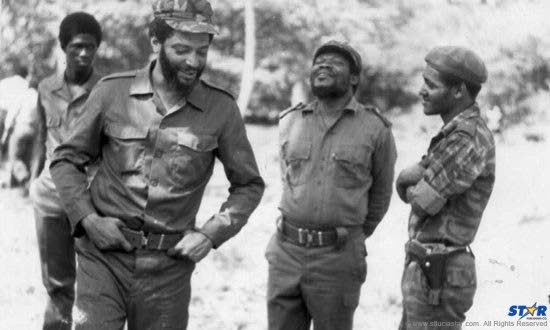Grenada Revolution: ‘We come for Maurice’

On October 20, 1983 Maurice Bishop, prime minister of Grenada, was shot dead in a bloody coup, along with ten others, after a violent split in his party.
Bishop’s New Jewel Movement had staged the socialist “Revo” in 1979 against the dictatorial prime minister Eric Gairy. After the coup, US troops invaded the island (TT was one of the few Caribbean countries which opposed the US invasion, along with the Bahamas, Belize and Guyana). The coupmakers, the “Grenada 17,” were tried and imprisoned. They were freed in 2008.
This week we publish a fourth excerpt from Godfrey Smith’s new book The Assassination of Maurice Bishop.
GODFREY SMITH
A massive, militant crowd of 15,000 was now assembled in Market Square. Someone on a microphone kept making announcements but the crowd seemed oblivious to him and kept up a steady chanting: “B for Bishop, B for betterment, C for Coard, C for communism; no Bishop, no revo.” The atmosphere was electric. People were waving, pumping and brandishing pro-Bishop placards.
One placard in particular stood out and was completely out of place. It read, “God Bless America.” No genuine Bishop supporter or organiser would have painted such a placard. Elements opposed to the revolution were at work, most likely CIA agents or paid subversives, taking advantage of the crisis to sow further discord.
Unison stood elevated on the tray of a truck, passionately whipping up the crowd. The prime minister was under house arrest at his official residence at Mount Wheldale, about a mile away from St George’s, he shouted, “and we have to go up there and free him.”
Alister Hughes embedded himself in the crowd, his tape recorder whirring, picking up bits and pieces of conversation but mostly the raucous noise of the crowd. As he listened to Whiteman, he feared that a confrontation was in the making. There could be violence. With butterflies in the pit of his stomach, he began following the surging crowd moving off from Market Square behind the indefatigable, implacable Unison Whiteman.
***
At the Central Police Station on the Esplanade, Vincent Roberts, operations officer, had no tear gas, but explained the effects of the CS- and CN-type tear gas. He doubted whether the soldiers understood the technical aspects like wind drift and point of release of the canisters. Tear gas shells were located at the Grand Anse police station three kilometres away. The soldiers rushed off in search of the tear gas.
By the time Redhead returned with tear gas, it was too late. The crowd had already left Market Square, wending its way up Market Hill, along Lucas Street towards Mount Wheldale. The students were chanting, “No Bishop, no school,” and “We want we leader.”
Meanwhile, Norris Bain was over at Sir Paul Scoon’s residence pleading with him to take some kind of action. He said Bernard Coard was holding secret meetings at his house while the prime minister was under house arrest.

“Grenadians are looking to you to resolve this problem; we really want you to do something about it.”
Scoon smiled and said, “I can only do something if the prime minister advises me to. Remember, I did not appoint these ministers.”
Uni, bare-chested and sweating profusely in the sweltering heat, led the masses from Market Square up the steep incline of Market Hill Street, along Lucas Street and onto to Upper Lucas Street, the crowd chanting and breaking into chorus all the while.
To Alister Hughes, the crowd was a like a tidal wave: you either went with the flow or got carried along by the human current. Could Coard, the brilliant tactician, not have anticipated that this would be the people’s reaction to the imprisonment of their revered leader?
As the human turbulence approached, Sello and other CC members were peering over Coard’s verandah rail pointing out people they recognised in the crowd. Coard summoned everyone back into his living room. He sat near the glass sliding door, H.A. sitting in front of him. The others sat on chairs around. They were speaking and taking notes.
Then, downstairs in the yard, soldiers started taking off their uniforms and putting on civilian clothes. Ram Folkes and eight of his men, all of them in civvies, formed a human cordon outside the first checkpoint to prevent the crowd pushing past the sentries.
The crowd swarmed the security barrier pushing them back and forcing them to retreat to the main gate. Abdullah got into a standoff with the crowd. Ram quickly intervened. He was afraid that, left to Abdullah, things could quickly deteriorate into a mess. He tried to reason with Vince, urging him to lead the people away from Mount Wheldale.
“Vince, man, it ent proper leading this crowd of people beyond a military checkpoint, what’s that, man?” Ram pleaded.
“Ram, you ent know wha’ going on here,” Vince responded, his confidence and adrenalin surging with the thousands at his back. “We ent going anywhere. We come for Maurice.”

-
The confrontation rapidly escalating, Layne and Cornwall hurried down to try and bring the situation under control. In the raucous, chaotic back-and-forth, Cornwall stupidly blurted that Maurice Bishop had betrayed the masses. Deafening shouts and derisive comments instantly drowned him out.
Layne tried to reason with them. They were in the middle of negotiations with Cde Bishop and were waiting for his response to certain proposals, after which matters would hopefully be resolved.
There was no relenting; the crowd kept pressing forward.
Layne, anticipating that the situation would escalate, had dispatched an officer to Fort Frederick, where the motorised unit of the army was based, to deploy three armoured personnel carriers (APCs) to Mount Wheldale.
A section of the crowd refused to move to allow the APCs to pass through. Someone quickly pulled the key from the ignition switch of a jeep that was parked in the middle of the road and disappeared into the crowd.
Layne realised that the APCs would not be able to pass without a major confrontation. Handing his pistol to a soldier, he walked calmly through the crowd, insults pelting him as he passed, and instructed the officer in charge of the APCs to reverse and go around through a back route.
The APCs had a tough time climbing the steep, rough back entrance to Mount Wheldale. One broke down. Of the two that made it to the top, one was placed in the road and the other in Maurice’s yard as a deterrent to the crowd attempting to come through the metal gate of the compound.
The crowd churned, an angry pulsating mob heaving against the gate, which groaned and bent under the immense crush.
Abdullah squeezed off three short warning bursts from his M-3 sub-machine gun.
Brrr! Brrr! Brrr!
People scattered in all directions but the nucleus of the crowd continued to press. Someone shouted, “They won’t fire on the people.”
An APC fired several booming bursts from its heavy-calibre machine gun into the air. Scores of people scattered, throwing themselves on the ground.
Still the core kept pressing, led by Abdul Sultan Jabbar. Jabbar was a short, stocky, fearless Maurice loyalist who had been involved in an infamous robbery and had been defended by Maurice. He confronted Abdullah, staring him down and pushing the gate and shouting at top of his voice. The crowd was uncontrollable, but no one was armed.

Militia on patrol on the streets of Grenada. -
Abdullah backed away as the gate, which spanned the entire road leading to Maurice’s house, began collapsing in toward him. He raced inside the house, still hoping to fulfill his mission of keeping the crowd away from Maurice. The crowd surged into the house behind him, leaping over chairs and coming towards Abdullah.
“The people have come for me, Dules,” Maurice said. Abdullah realised it was hopeless to try and stop them unless he fired on the people. He stood down. Uni entered and ecstatically embraced Maurice before escorting him out.
The crowd erupted, shouting deliriously, “We found we leader, we got we leader, no to Coard, no to communism!”
Maurice feebly tried to scramble onto the back of a truck but could not manage it. He was weak and drained. Someone placed him into a car along with Jackie. The noisy throng followed behind chanting incessantly, madly, "We get we leader."
Lyn Creft, Jackie’s mother, waited anxiously on the side of the road to see her daughter. She caught a glimpse of her inside the car sitting beside Maurice but it did not stop to allow her a chance to approach through the dense crowd.
Alister had fled when the first warning shots were fired. He was back in the press of the crowd, tape recorder at the ready. He approached the junction of Lucas Street and Mount Wheldale roadway. The human wave swept back from Mount Wheldale towards Lucas Street, forcing him off the road. There was wild shouting and jubilation. He could see the prime minister, who had for some reason alighted from the car and was among the people. People were desperately trying to embrace and kiss him. He looked pale, tired, dishevelled and spaced-out. He seemed to have difficulty finding his feet and was just being swept along by the tumultuous crowd.
Hughes clawed a path through the dense, swarthy mob to the prime minister, his arm outstretched, clutching a microphone. When he got within range he shouted to Bishop to say something. But the terrific din of the horde was too great. All that he could make out amidst the pandemonium were the words “the masses” before the great tidal wave swept him away from his sight forever.
Godfrey Smith, a former attorney General of Belize, is the author of George Price: A Life Revealed (2011), for which he won the Bocas prize for non-fiction in 2012. He is also the author of Michael Manley: The Biography (2016).
The Assassination of Maurice Bishop is published by Ian Randle Publishers, 1 (876) 978 0745, info@randlebooks.com. Available online at www.amazon.com, BookFusion.com and in bookstores.


Comments
"Grenada Revolution: ‘We come for Maurice’"